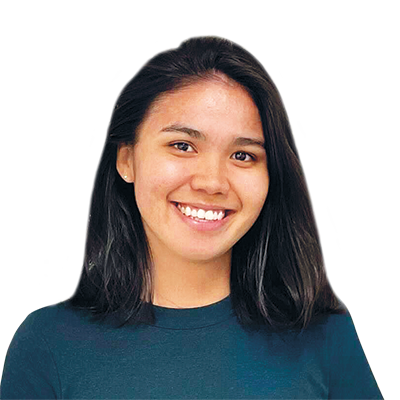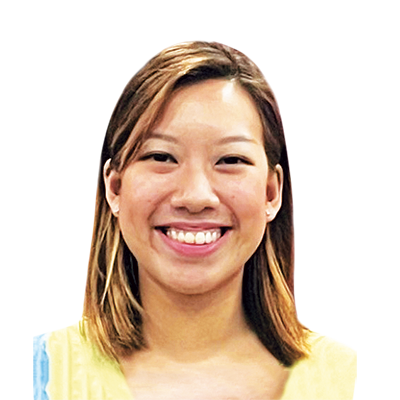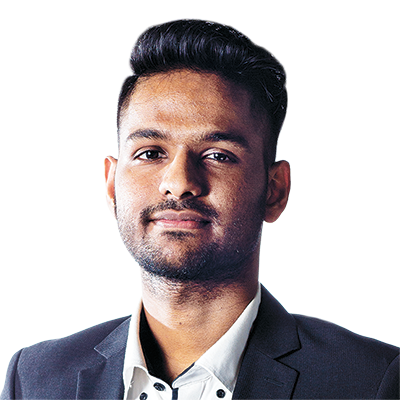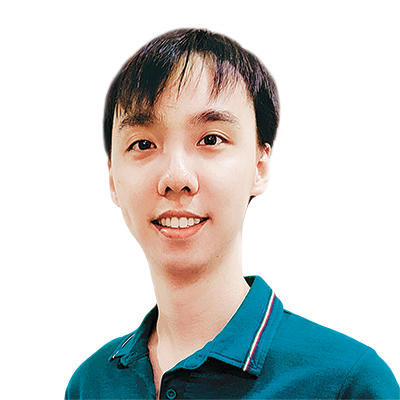Disrupted, But Not Derailed
Six soon-to-be alumni share stories of interrupted dreams, adjusted aspirations, and the resilience to move forward in uncertain times.
Into the Great Unknown
What is it like to graduate in the midst of ‘the crisis of a generation’? A group of final-year NUS students and soon-to-be alumni hoping to begin the next chapter of their lives talk about how they are responding to the challenges that have surfaced in a world turned upside down by COVID-19.
OUR PANEL

Mr Aqil Halifi Aminuddin
(Year 4, Arts and Social Sciences)

Ms Claire McColl
(Arts and Social Sciences ’21)

Ms Claryl Ho Jia Le
(Year 4, Arts and Social Sciences)

Mr Jothinandan Pillay
(Computing ’21)

Ms Le Khuc Hoang Uyen
(Year 4, Business & Communications and New Media)

Mr Shaun Tay Wei Jun
(Business & Communications and New Media ’21)
What were your goals and aspirations when you entered NUS as a freshman?
Aqil Halifi Aminuddin: I initially focused on academic achievements, but naturally progressed to thinking about my career. A lot of my peers in Psychology are very passionate about our field of study and prefer to be practising psychologists. But our major requires us to attain a Masters degree or beyond in order to be one. Do I want another two years of Zoom classes? For Psychology students, conducting research, observing behaviour and gauging micro-expressions online is very challenging. So while I am interested in Childhood Psychology, I adjusted my goals and aspirations and am now turning to my backup plan for a career in HR. I also had to readjust my plans as my overseas exchange was cancelled and I was held back for a term. I am currently interning with a HR consultancy that allows me to transition into a full-time role upon graduation.
Shaun Tay Wei Jun: The first year in university was really all about joining activities to have fun! But by the second year, I grew to think more strategically to build upon my field of expertise in marketing, and began to actively take on internships and side jobs. The degree is just a piece of paper: the training, exposure and insights I gained through my NUS experience are what allows me to find my direction in life.
Claire McColl: I chose my degree out of interest rather than for practical or strategic reasons. Unless you are doing a professional degree and going into a field that requires the technical background, adapting and learning in the workplace is going to play a big part in your career, rather than just your paper qualifications. What I wanted out of my time at NUS were connections that can help me open doors and widen my horizons, and programmes that I could leverage on upon graduation.
Jothinandan Pillay: I took the practical route for sure, and admit to not being super-passionate about computer science in the beginning — though I grew to love it. Even so, it was never just about the academic stuff, and I always wanted a holistic university experience. Staying in King Edward VII Hall for all four years (Jothi has been nominated as King Edward VII Hall Class Ambassador 2021 and has served in leadership roles at the hall) provided a good counterpoint against the intensity of the academic
side of things.
Le Khuc Hoang Uyen: A holistic college experience was very big for me too. I am very practical, and being on scholarship, I was focused on my academic results. However, I also wanted to see what I can get out of a university education: which is the ability to learn independently, rather than from textbooks or through a class.
Claryl Ho Jia Le: Indeed, it isn’t just about the degree, but also getting to experience campus life, and going on exchange overseas — these are also important, formative parts of university life, which I looked forward to. I was very excited to enroll in an exchange programme to Seoul National University together with a good friend — I have always been very interested in Korean culture and even studied the language at NUS. Yet just one week after we arrived in Seoul, we were told to return to Singapore because of the COVID-19 pandemic. At that point, I really felt like my dreams were shattered.
Career-wise, what had you hoped to find — and what cards have you been dealt with in reality?
One week after we arrived in Seoul, we were told to return to Singapore because of the COVID-19 pandemic. At that point, I really felt like my dreams were shattered.
Ms Claryl Ho Jia Le
Claryl: Being on scholarship, I already have a job upon graduation. However, some of my friends have not been able to get the jobs they want, while others settled with traineeships. That said, the demand for social workers is quite high now and there are many opportunities out there in the market — though often at a lower starting pay than it would be for say, Engineering graduates. It is a physically and psychologically demanding job and we do feel like we deserve more.
Shaun: I have been preparing myself to get into a marketing or communications role and have sent out 100 applications since last November, ahead of my graduation. However, I have only been called for three interviews so far! The way I see it, the batch of Business graduates before me had to take the brunt of the pandemic as the world was grappling with such rapid change — we, on the other hand, had one year to “prep” for it! However, this means that many of my seniors from the 2020 batch who took up temporary jobs are still looking for entry-level roles, and I am now fighting with them for the same positions in a space oversupplied with Marketing graduates. This, however, is a role-specific observation, for most of my friends in Engineering have already secured jobs. Also, while the pandemic has impacted the economy, I feel that one should be ready to face such challenges anyway, and I am now considering pivoting into product management, in hopes of finding employment.
Claire: I secured a job two weeks ago but had an experience very similar to Shaun. While a lot of my friends in Sociology only started applying after they finished their last paper, I started my search last October, when my friends in the Business faculty started taking the associate programmes that were open for application. Since then, I have been going for interviews — some which went pretty far, but eventually fell through. But you cannot be discouraged and have to just keep going forward. Pandemic or not, we are a graduating batch, and we have to work!
Uyen: I do feel like we have a lot of uncertainties to deal with, but I think it also trains our graduating batch to be more open-minded. Your first job is a big milestone for sure, but my seniors and mentors also tell me that a lot of things can change in the course of one’s career. Not securing your first job as you had envisioned doesn’t mean that the story is over.


WHAT ARE THE PROSPECTS?
A 2020 joint employment survey of 11,800 fresh graduates from NUS, Nanyang Technological University, Singapore Management University and Singapore University of Social Sciences showed that,
69.8% of fresh graduates found permanent full-time jobs last year, down from 81.7 per cent in 2019.
Graduates from information and digital technologies, health sciences and business clusters registered the highest percentages of permanent full-time employment.
What about hopes of working abroad?
Jothinandan: A friend applied for, and secured, a position in Sweden and will be heading over in July. The Singapore Government has also been supportive in fast-tracking his vaccination appointment, which helped to facilitate things abroad. I would say that while working overseas is more difficult now, it
is not impossible.
Claire: My friend is also starting a consulting role in Copenhagen. It depends on luck in some parts, and your access to opportunities — which is not equal for all. We just have to deal with the cards that we
are dealt with.
Aqil: I have always wanted to work in Japan, and am now doing my internship with a Japanese HR consultancy. That said, I would say the earliest I might be able to go back to Japan would be in… five years? (Laughs) But I am focusing on gaining more experience, and looking for as many opportunities as possible to learn about business practices in Japan while I am in Singapore, so that I can be prepared when the opportunity finally comes. And if it never comes, I could still stay in Singapore and continue to do what I am doing. It’s about constantly managing expectations and aspirations, but still working towards what you really want.
Uyen: I am bonded to work in Singapore, but had originally hoped to get a more regional role — I am guessing that won’t happen anytime soon! But what Aqil said makes sense: when the laws of maximising gains are not applicable, one should aim to minimise loss by gaining as much experience as possible —
be it through internships, signing up for courses and mentorship programmes, or building your network online. When things are moving at a slower pace, it is a good time to build yourself.
Do you feel that you are facing unprecedented challenges as a graduating batch?
Claryl: There were certainly “Why me?” moments, such as when the exchange that I had looked forward to was cancelled. But you have to take stock and realise that there are still opportunities, and that we as university students are already in a position of privilege compared to many others.
Claire: The expectations of our generation are pegged to the current state of social and economic progress. We look at the playing field now and set our own benchmarks based on it. Similarly, the older generation would have had their own benchmarks in their time.
Shaun: Different generations face different challenges: it is hard to say who has it easier or harder. The older generation had more bread-and-butter considerations, but for us, it is more about personal aspirations, and societal and family expectations. Failure is not acceptable! (Laughs) For graduates today, it’s not just about seeking a job, but a good job.
Uyen: As much as our generation has our “Why me?” moments, we move on and learn to deal with what we have. Resilience isn’t just about hardcore strength, but adaptability and flexibility. Prior to the pandemic, I had been a typical type-A personality and a planner. This period has taught me that there are many external factors that you cannot plan for: you can only prime yourself to be ready for change. If anything, the challenges we face make us better and stronger — we certainly are not ‘snowflakes’.
Do you see the shift towards working and studying online a pro or con?
Jothinandan: Working from home is a new challenge that I am concerned about. As a new team member in a company, you need to build relationships with the people you work with in order to have rapport, to align, or even just to call in a favour. The move towards virtual communications in the workspace makes building strong relationships quite difficult. This is what I found, contrasting the two internships I did — one in my second year, when it was still business as usual, and one at the end of Year Three which started off with WFH arrangements and ended during Phase 2 last year, when we could finally go into the office on certain days.
Aqil: As a Psychology student, online learning and research is not ideal. But as a member of the workforce, I have observed that while my company used to conduct annual trips to the different markets to hold learning sessions, transferring our operations online has allowed teams from different markets to be in closer communication than before. It has also allowed for better consolidation and sharing of knowledge.
Uyen: During my six-month internship at IBM, I enjoyed a very good learning environment with a pipeline of projects. Yet when the pandemic hit, we had to cancel some of these campaigns and projects, and it limited my scope of work. That said, being in a MNC meant that we were able to shift our attention and jump into other markets that I previously wasn’t handling. I ended up liaising with the APAC team a lot, which opened up new opportunities too.
Amid grappling with uncertainty and dealing with new norms, is there a silver lining that you see?
Resilience isn’t just about hardcore strength, but adaptability and flexibility. If anything, the challenges we face make us better and stronger — we certainly are not ‘snowflakes’.
Ms Le Khuc Hoang Uyen
Aqil: While I had to stay back for a term due to my cancelled exchange, the leave of absence felt like a long vacation and made me reflect on what I want in life. For so long I was fixated on a future in Japan,
but then I realised that there’s more to life.
Uyen: As an international student, I am thankful for being able to stay at home with my family! I am an extrovert and staying at home is not something I expected to love, but this period of time has allowed me to think about the relationships I have and put more effort into nurturing the ones that are important to me. So while the past year might have been unstable on the career front, it was mentally and emotionally pleasant to have time for myself and those around me.
Jothinandan: I am glad that the importance of mental health has really come to the fore since the pandemic. It’s a topic people knew about, but never placed a lot of emphasis on previously. Since the Circuit Breaker last year, I find more people actively checking in on those around them. It should not have taken a pandemic for mental health to be highlighted, but it certainly has helped, especially in terms of getting the campus and the administration to put an emphasis on mental wellness. That to me is a great silver lining.